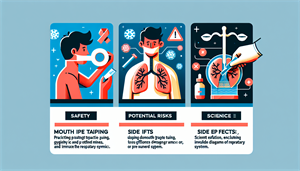
Does Smoking Cause Snoring? Exploring the Link Between Smoking and Sleep Disorders
Did you know that smoking could be the hidden culprit behind your snoring and sleep disorders? This blog post will delve into the question, “does smoking cause snoring?”, and how it can affect your overall sleep health. By understanding how smoking contributes to these issues, you can take the necessary steps to improve your sleep quality and reduce the risk of developing sleep disorders such as obstructive sleep apnea (OSA).
Key Takeaways
-
Smoking increases the risk of snoring, sleep apnea and other sleep disorders.
-
Quitting smoking is the most effective way to reduce these risks and improve overall health.
-
Alternative nicotine sources such as vaping or marijuana should not be used for treating sleep apnea due to potential associated risks.
The Connection Between Smoking and Snoring
Many people are unaware that cigarette smoke has been found to be linked to snoring due to airway inflammation and mucus production, as well as nicotine’s effect on sleep patterns. It is estimated that the prevalence of habitual snoring among men is between 16 and 33%, while among women, it is between 8 and 19%. Poor sleep quality is often associated with snoring, and research suggests that smoking may contribute to an increased likelihood of snoring and obstructive sleep apnoea.
It is widely acknowledged that obesity, upper airway abnormalities, and male sex are the primary risk factors associated with snoring and sleep apnea. However, passive smoking or secondhand smoke exposure can also contribute to these issues. Smokers are more than twice as likely to snore as individuals who do not smoke. Continuous positive airway pressure (CPAP) therapy can help alleviate snoring and sleep apnea symptoms.
Inflammation and Mucus Production
Smoking has been observed to induce an immunologic response to vascular injury, thus resulting in augmented levels of inflammatory markers, which can be considered a risk factor. These markers include: CRP fibrinogen IL-6 CEA In addition, smoking has been associated with the proliferation of proinflammatory bacteria, further contributing to inflammation. As a result, inflammation and mucus production caused by smoking can lead to snoring by constricting the airway. Halting smoking can lessen these effects.
With the cessation of smoking, inflammation and mucus production in your airways may decrease, aiding in the reduction of snoring and sleep apnea risk. This can lead to a better night’s sleep and improved overall health.
Nicotine's Impact on Sleep Patterns
Nicotine, which is found in cigarette smoke, has a detrimental effect on sleep patterns, making it more difficult to attain restful sleep and elevating the risk of snoring. Research has demonstrated that cigarette smoking is correlated with elevated levels of CRP, fibrinogen, IL-6, and CEA, which can impact sleep quality. Nicotine disturbs the sleep-wake cycle, resulting in difficulty initiating and maintaining sleep, and smokers often experience a reduction in the duration of sleep. While stopping smoking might initially worsen sleep issues, it can enhance sleep quality over time.
Abandoning the habit can therefore improve your sleep and decrease the likelihood of snoring and sleep apnea.
Obstructive Sleep Apnea: Understanding the Risks
Obstructive Sleep Apnea (OSA) is a condition in which a person experiences multiple episodes of cessation of breathing during the night, often referred to as sleep disordered breathing. This serious sleep disorder can lead to or exacerbate other health issues such as hypertension, cardiovascular disease, and cerebrovascular accident. Smoking has been known to cause inflammation and irritation of the upper airway, thereby obstructing the airway and making respiration more challenging, which may lead to sleep apnea symptoms.
Discontinuing smoking is the most potent strategy for reducing the risk of sleep apnea and improving overall sleep health.


